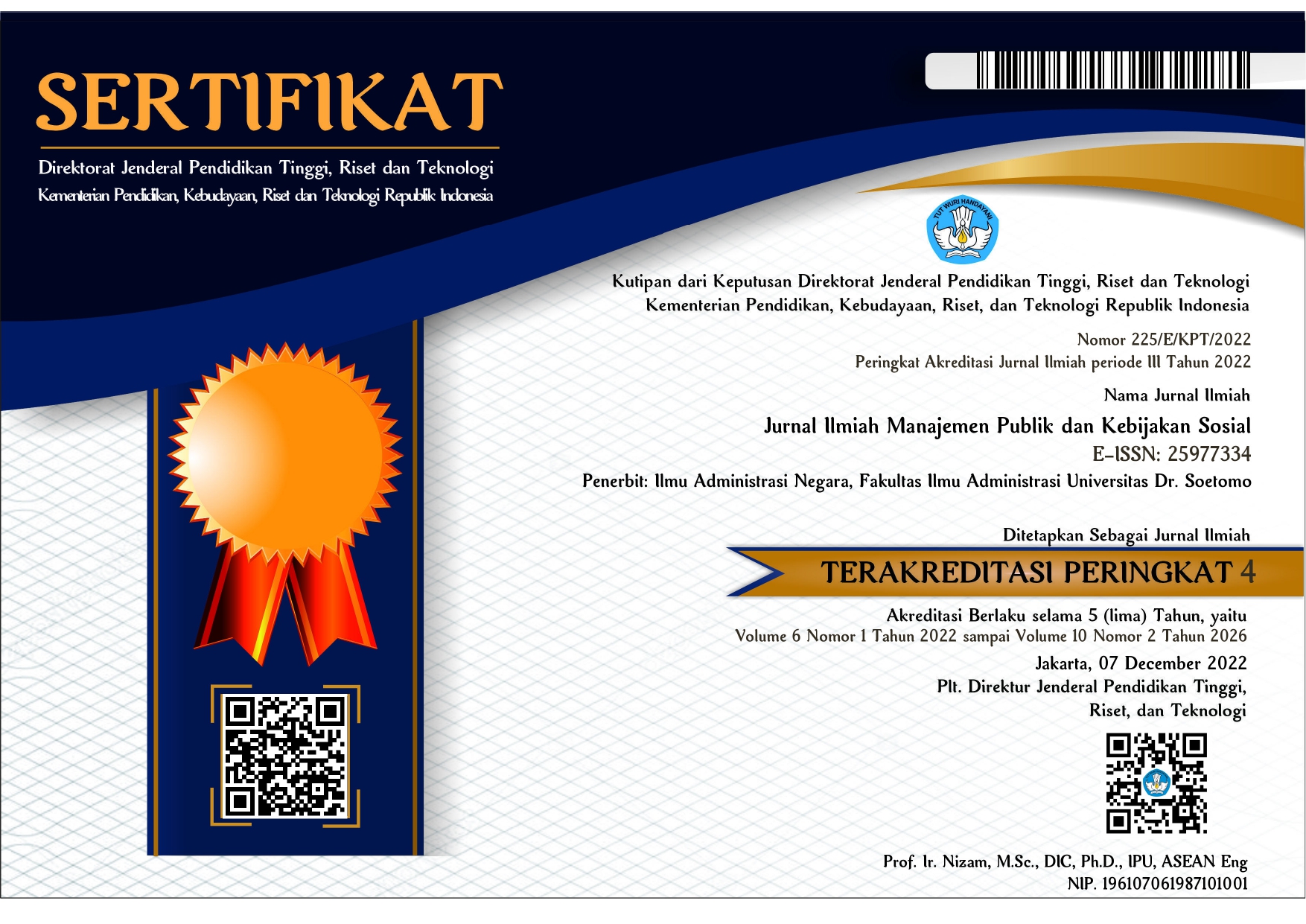Penguatan Tugas Pokok dan Fungsi Pemerintah Desa dengan Pendekatan Analisis Jabatan (Studi Kasus Desa Palaan, Kecamatan Ngajum, Kabupaten Malang)
 Abstract views: 1234
,
Abstract views: 1234
,
 PDF downloads: 1093
PDF downloads: 1093
Abstract
ABSTRAK
Otonomi yang semakin luas harus didukung oleh kinerja pemerintah desa yang profesional. Pemerintah desa harus mempunyai struktur organisasi internal yang kuat dengan pembagian tugas pokok dan fungsi yang jelas untuk mendukung kinerja organisasi. Kendala yang terjadi di Pemerintah Desa Palaan adalah implementasi tupoksi dari beberapa jabatan dalam struktur organisasi Pemerintah Desa Palaan yang mengalami tumpang tindih pekerjaan. Penelitian ini berusaha memperkuat tugas pokok dan fungsi organisasi pemerintah desa dengan pendekatan analisis jabatan. Subyek penelitian adalah Pemerintah Desa Palaan, Kecamatan Ngajum, Kabupaten Malang. Penelitian dilakukan dengan metode kualitatif dan teknik pengambilan data dilakukan melalui observasi dan wawancara. Hasil penelitian yang dilakukan dengan pendekatan analisis jabatan menghasilkan luaran penegasan wewenang dan pelaksanaan tupoksi Kaur Pembangunan dan Kasi Pemerintahan, serta perumusan ulang tupoksi Kepala Dusun. Pemerintah Desa Palaan juga perlu melakukan sosialisasi hasil perumusan tugas pokok dan fungsi kepada seluruh perangkat desa.
Â
ABSTRACT
Broader autonomy must be supported by the performance of a professional village government. The village government must have a strong internal organizational structure with a clear division of main tasks and functions to support organizational performance. The obstacle that occurred in the Palaan Village Government was the implementation of the main tasks and functions of some positions in the Palaan Village Government organizational structure that experienced overlapping work. This study seeks to strengthen the main tasks and functions of village government organizations with job analysis approach. The subjects of the study were the Palaan Village Government, Ngajum District, Malang Regency. The study was conducted with qualitative methods and data collection techniques was carried out through observation and interviews. The results of the research conducted with the job analysis approach resulted in a confirmation of the authority and implementation of the main tasks of the Head of the Development Affairs and Government Section Head,, as well as the reformulation of the function of the Head of Hamlet. Palaan Village Government also needs to disseminate the results of the formulation of basic tasks and functions to all village officials.
Â
References
Dokumen Tugas Pokok dan Fungsi Pemerintah Desa Palaan. 2018
Kadarisman, M. 2018. Manajemen Aparatur Sipil Negara. Depok: PT Rajagrafindo Persada.
Marwansyah. 2016. Manajemen Sumber Daya Manusia, Edisi Kedua. Bandung: Alfabeta.
Noe, R.A., Hollenbeck, J.R., Gerhart, B., & Wright, P.M. 2010. Human Resource Management Gaining a Competitive Advantage: International Edition. Singapore: McGraw-Hill Education (Asia).
Peraturan Menteri Desa, Pembangunan Daerah Tertinggal dan Transmigrasi Nomor 16 Tahun 2018.
Peraturan Menteri Dalam Negeri Nomor 84 Tahun 2015.
Peraturan Pemerintah Nomor 72 Tahun 2005.
Silalahi, U. 2006. Metode Penelitian Sosial. Bandung: UNPAR PRESS.
Sofyandi, H. 2008. Manajemen Sumber Daya Manusia. Yogyakarta: Graha Ilmu
Struktur Organisasi Desa Palaan Kecamatan Ngajum Kabupaten Malang. 2018. Retrieved from https://desapalaan.wordpress.com/struktur-organisasi/.
Sugiyono. 2009. Metodologi Penelitian Pendidikan. Bandung: Alfabeta.
Undang-Undang Republik Indonesia Nomor 4 Tahun 2014.
Authors who publish with JIMPKS: Jurnal Ilmiah Manajemen Publik dan Kebijakan Sosial agree to the following terms:
-
Authors retain copyright and grant the journal right of first publication with the work simultaneously licensed under a Creative Commons Attribution License (CC BY-SA 4.0) that allows others to share the work with an acknowledgment of the work's authorship and initial publication in this journal.
-
Authors are able to enter into separate, additional contractual arrangements for the non-exclusive distribution of the journal's published version of the work (e.g., post it to an institutional repository or publish it in a book), with an acknowledgment of its initial publication in this journal.
-
Authors are permitted and encouraged to post their work online (e.g., in institutional repositories or on their website) prior to and during the submission process, as it can lead to productive exchanges, as well as earlier and greater citation of published work.










